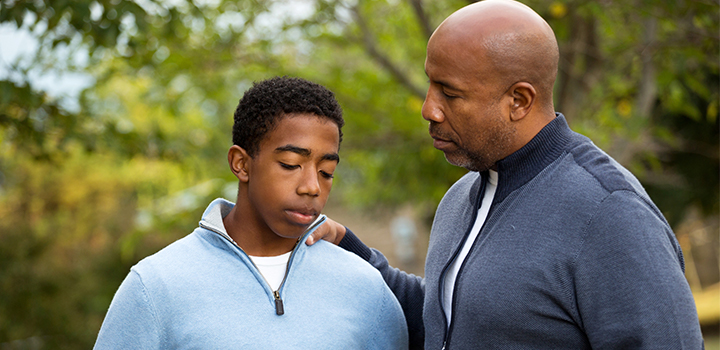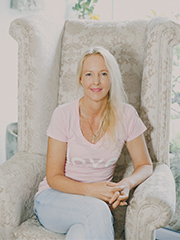How to tell your children about your cancer diagnosis

Cancer never happens in isolation. Your diagnosis will have far-reaching effects on all your loved ones, including your children. No matter what their ages, they have a knack of detecting when you’re upset or when something is wrong.
They’re sensitive to your moods and quick to pick up secrets, and only having half the story will result in imaginary, scary scenarios and unnecessary anxiety. Although there’s no golden rule about when to break the news to children or young adults, being upfront with them right from the start will help them to deal with the new family reality, as well as allay their fears.

Prof. Carol Ann Benn shares advice on telling children about a cancer diagnosis.
Regardless of their age, your children need to know that you’re not well, explains Professor Carol Ann Benn, a surgeon with a special interest in breast cancer: “Of course as a parent your role is to protect them. But, unfortunately there’s simply no shield from stress and you’ll be doing them a great disservice if you try to pretend that nothing is wrong. Incorrect assumptions are often made when they’re not informed about what’s going on, with a damaging effect on their behaviour, their school work and their friendships. Explaining your diagnosis will not only promote a family environment that can deal with stressful situations and challenges, but will also allow communication options for your children to discuss how your condition and treatment will impact upon their daily lives.”
How to break the news
Prof. Benn suggests involving your medical team when you decide to tell your children. “That’s because seeing a doctor sitting in front of them makes the prospect of what you’re going through real, and less frightening,” she explains, “Remember that all children react differently, dependant on their age, temperament and relationship with you. But they will react to the news! So expect tantrums, sulks, tears and a whole array of possible negative behaviours. If you’re concerned about their ability to cope, rope in the assistance of an onco-psychologist or other sort of therapist. Don’t avoid difficult questions such as ‘Are you going to die?’. I often explain it all to teenagers in terms of the stress their parents face when they are learning to drive, and the fact that the risk of death for an 18 to 23-year-old on the road, is far higher than for a cancer patient undergoing treatment. Cancer does not equal immediate death or death in many circumstances, but it does mean that the concept of the fragility of life, and the concept of death being a part of life, is real and scary. So having a mom and dad sick in hospital or on chemo is a frightening reality for a young child, pretty much like having the superhero not being able to save the day. So you can try to explain that all superheroes have run-ins with baddies and most recover with a few scrapes and bruises.”
Top tips for sharing the news with kids:
Prof. Benn offers the following general guidelines when it comes to telling your child about your diagnosis and treatment:
- Always tell your child’s teacher and the school, and ask for their involvement and support
- Remember that children require additional attention to adjust, and you’ll need to modify any ongoing information according to their age, stage and personality
- Pay close attention to any significant behavioural changes – if these persist for more than a few weeks they may be warning signs that professional help is needed
Telling the two to seven-year old
Use concrete terms, advises Prof. Benn, with analogies from storybooks or movies they are watching on TV or toys that they are playing with. “Barbie and Disney have never let me down for an array of stories about goodies and baddies!” she adds.
- Explain that your illness is not their fault.
- Don’t frighten or overload them, small bits of information are far easier to digest at this age.
- Try to maintain as much of your day-to-day norms and routines as possible, as young children don’t like any upheaval. Ensuring that their world is intact as much as possible will go a long way in helping them to cope. If things do have to change, make this a fun adventure: “For example, ‘You’re going to stay with aunty, who is going to spoil you and take you for ice cream after school. Aren’t you a lucky little girl (or boy)?”
Chatting to children aged seven to 12
- Ask for their input, again using analogies from narratives well-known to kids in this age group, for example from Harry Potter or Star Wars.
- Keep communicating with them to find out what they understand about what’s happening to you - and always correct any misunderstandings
- Always allow them to participate in changing routines.
A heart to heart with an adolescent
- It’s essential to give teenagers details about your diagnosis, as their lives revolve around the Internet where information – accurate or no – will be at their fingertips if they go looking for it. Always participate and help them with online searches and direct them to safe sites
- Limit new responsibilities, as this could lead to resentment about having extra duties added onto their plates when they’re trying to deal with what’s happening to you.
- Encourage activity in school, sport, and other activities to keep them occupied and control stress.
The Discovery Health Medical Scheme is an independent non-profit entity governed by the Medical Schemes Act, and regulated by the Council for Medical Schemes. It is administered by a separate company, Discovery Health (Pty) Ltd, an authorised financial services provider.
Related articles
Engaging with your employer about your cancer
It isn’t easy to share your cancer diagnosis with others, especially if you’re still battling to come to terms with it yourself. Thinking about going public in the workplace can understandably fill you with anxiety and fear.
You've just been diagnosed: now what?
'Cancer.' Hearing your doctor utter the word can see you experience a heart-stopping moment, coupled with shock, disbelief and terror. These normal reactions can send you into a complete tailspin, as you begin exploring your options.
Navigating your Cancer Journey
'You're not alone'. While these three little words may offer little comfort while you're reeling from the shock of being newly diagnosed, it's an absolute given that no one ever faces their cancer journey in isolation.